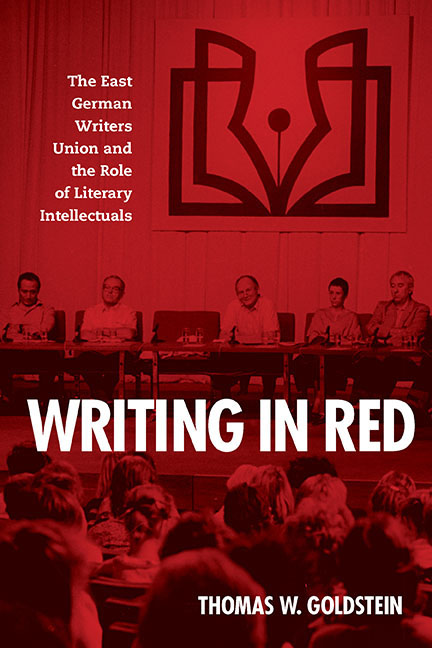Book contents
- Frontmatter
- Contents
- Acknowledgments
- List of Abbreviations
- Introduction
- 1 German Writers Associations through 1970
- 2 Socioeconomic Functions
- 3 The Era of No Taboos? 1971–76
- 4 A Disciplining Instrument, 1976–79
- 5 Defending Peace, Defining Participation, 1979–83
- 6 Years of Resignation, 1983–85
- 7 Glasnost in the GDR? 1985–89
- 8 Coming Full Circle, 1989–90
- Conclusion
- Notes
- Bibliography
- Index
7 - Glasnost in the GDR? 1985–89
Published online by Cambridge University Press: 24 August 2019
- Frontmatter
- Contents
- Acknowledgments
- List of Abbreviations
- Introduction
- 1 German Writers Associations through 1970
- 2 Socioeconomic Functions
- 3 The Era of No Taboos? 1971–76
- 4 A Disciplining Instrument, 1976–79
- 5 Defending Peace, Defining Participation, 1979–83
- 6 Years of Resignation, 1983–85
- 7 Glasnost in the GDR? 1985–89
- 8 Coming Full Circle, 1989–90
- Conclusion
- Notes
- Bibliography
- Index
Summary
BY THE LATE 1980S THE SCRIPT for writers congresses was familiar: they were part business conference, part propaganda showpiece where prominent authors gathered to discuss literary issues and demonstrate support for the SED. The tenth congress was to be no different. As with previous congresses, it would begin with a brief opening ceremony and a perfunctory vote on the schedule, followed by the reading of Honecker's welcome and Kant's keynote speech. Before the congress opened on November 24, 1987, there was little evidence of anything amiss. Perhaps the presence, for the first time at any artist congress, of the Western media should have been a cause for concern, but it was hoped that by limiting access to the plenary sessions, they would ensure that foreign journalists would merely witness the normal chorus of pro-SED acclamations by delegates. There had been rumblings at district election meetings before the congress, but the presidium was confident they would be able to frame discussions to eliminate any controversies.
Yet when the congress began, hints of turmoil surfaced immediately. Stephan Hermlin opened the meeting by recalling the First Writers Congress forty years earlier. As it convened in 1947, workers were still clearing rubble outside while delegates cleared away “intellectual ruins.” He then pivoted to the delicate subject of those who had gone West in recent years, including “several essential writers.” This exodus was “certainly connected with bureaucratic or dogmatic obstacles,” he observed, “but I don't believe that the responsibility is found only on one side.” Hermlin's speech was a thoughtful consideration of the differences that had driven the two sides apart, and by contrasting the current divide with the united sense of purpose that had prevailed at the first congress, he suggested that the failure to resolve disputes was irresponsible. He was not explicitly critical of the GDR, but his careful words opened the door for others to do so.
Returning to the script, Henniger spoke next, asking delegates for comments on the printed schedule and list of discussion topics. This was pure formality, with attendees expected to nod their approval. But on this day the silence was broken by Horst Matthies, a forty-eight-yearold author from the Rostock district whose critical views had drawn Stasi attention over the years.
- Type
- Chapter
- Information
- Writing in RedThe East German Writers Union and the Role of Literary Intellectuals, pp. 169 - 198Publisher: Boydell & BrewerPrint publication year: 2017

